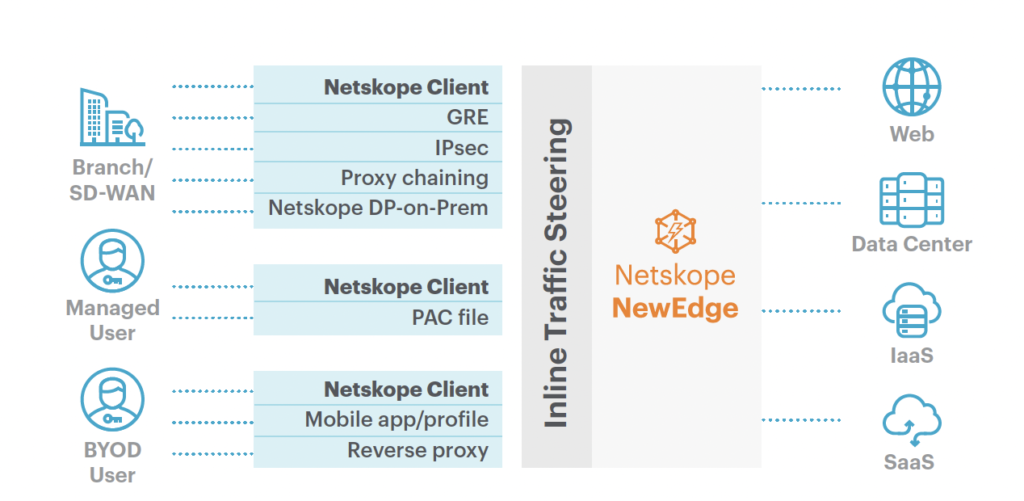In order to enable and sustain an effective and secure hybrid work environment, enterprises need security that can deliver protection anywhere, stop modern threats, ensure compliance, and maintain consistent policies across both on-premise and remote locations.
The expansion of the attack surface that came with remote work and the increasing use of public cloud were cited as major areas of cybersecurity concern in Gartner’s “7 top trends in cybersecurity for 2022.” Additionally, a shift to cloud and remote working has driven a 19% increase over the past two years in the average number of security tools organizations must manage–from 64 to 76.
With these factors in mind, it has become vital for enterprises to deliver security that can move with the data and the user, from an office or to any other location. All of this can be enabled by having converged cloud-delivered on-ramps that provide a single inspection point.
Building a secure and seamless user experience with Netskope Client
The Netskope Client enables any user connecting from any device or location to have a fast and secure work experience with no performance trade-offs for unified data and threat protection. Netskope adopts a multi-pronged approach that addresses the requirements of the modern user, as well as the network and security teams.
Built with a high-performant design that facilitates secure access service edge (SASE) deployments, Netskope Client steers traffic to the Netskope NewEdge network to take advantage of the Netskope Security Cloud services(including secure web gateway (SWG), cloud access security broker (CASB), zero trust network access (ZTNA), cloud firewall (CFW), and endpoint DLP), enabling holistic data protection and securing the hybrid work environment. The Netskope Client drives context-aware security based on zero trust principles across web, cloud, email, private apps, and endpoints.

Benefits for the user, the network, and the security teams
To deploy a sustainable cybersecurity strategy, organizations need their network and security teams to work together—which, traditionally, they haven’t. The Netskope Client enables the right approach to securing an organization’s hybrid workforce that doesn’t sacrifice performance and focuses on ensuring a superior work experience that often results in higher employee productivity. Here’s a breakdown of what this looks like for the hybrid user, as well as the security and network teams.
For Today’s Hybrid User:
Traditional security solutions need performance-intensive agents to be running on user devices, but these agents often introduce friction to the user experience with slow scanning times or a drag in system performance. A tradeoff between security and performance is no longer acceptable or practical. Employees need a seamless and secure work experience with contextual, high-performant security. The Netskope Client delivers the necessary modern security measures that enable the hybrid workforce to prioritize regular work without sacrificing security.
Benefits:
- Fast and secure access: The Netskope Client enables enterprise users to get speedy access backed by zero trust principles anytime anywhere–at the office, their home, or a cafe–at scale.
- Endpoint DLP: Govern endpoints to prevent sensitive content misuse with minimal resource and compute power utilization thanks to the agility of its cloud deployment, the minimized architectural costs and the unified policy schema.
- Superior user experience: The Netskope Client eliminates latency created by multiple agents working in silos, enabling a safe and seamless work experience, without having to face multiple security alerts from different agents that disrupt productivity.
For The Security Team:
While digital transformation projects continue to herald new security requirements, IT security teams face complex operational challenges managing numerous siloed security products deployed with multiple agents and across different consoles. According to Ponemon Institute’s Third Annual Study on the State of Endpoint Security Risk, 42% respondents stated complexity in managing multiple agents as a reason for ineffectiveness of security teams.
Moreover, lack of visibility into key assets, inability to detect advanced attacks, data overload due to myriad alerts from a number of endpoints, and inconsistent policies and controls further increase the burden on IT security teams.
Benefits:
- One agent for all security needs: The Netskope Client is a single agent for delivering all of Netskope’s products to simplify user experience, enhance IT agility, and deploy integrated security on an unified console.
- Consistent policy enforcement: Maintain uniform security policies on or off-premises to maintain a cohesive security posture.
- Flexible integrations: Ensure apt device classification, device posture checks, and identity protection through integrations lowering total cost of ownership (TCO).
- Simplified IT operations: Deploy security from a unified console with centralized provisioning, management, support, and troubleshooting.
- Zero trust access for apps: Continuous differentiated device posture checks with real-time posture enforcement using built-in and third-party integrations.
For The Network Team:
Securing through legacy technologies, such as MPLS or VPN, to route traffic often result in massive spends and demand a heavy bandwidth investment. Furthermore, these tools cannot consolidate or take too many different types of alerts coming in from different types of tools leading to a broken user experience and relevant threats escaping undetected.
Benefits:
- Zero-trust backed performance: The Netskope Client has a light-weight design, with secure tunnel and continuous, identity-focused, and risk-aware application access for all types of network traffic.
- High availability: Dynamic traffic steering with optimal path selection to the nearest edge, powered by data centers across 65+ regions to ensure fast access from anywhere for a superior user experience across web or cloud.
- Digital experience management: Get granular visibility through detailed reports and dashboards into performance, latency, users, devices, applications, app usage patterns, and data centers being accessed.
- Enhanced troubleshooting: Monitor all user traffic, telemetry data, and provide near real-time, actionable insights, and advanced debugging capabilities to enable contextual resolution.
A single app that goes beyond holistic security and builds resilience
Netskope Client delivers across diverse OS platforms including Android, iOS, macOS, Windows, Linux, Chrome OS, and multi-user platform support. It enables enterprises to make the most of everything the cloud can offer in terms of flexibility, cost management, and new approaches to business opportunity, while ensuring that business users, customers, data, and other precious assets are safe at all times. To learn more about how you can secure your remote workforce without the performance trade-offs, visit the Netskope Client page.




 Zurück
Zurück
















 Den Blog lesen
Den Blog lesen